3 Volumes
Constitutional Era
American history between the Revolution and the approach of the Civil War, was dominated by the Constitutional Convention in Philadelphia in 1787. Background rumbling was from the French Revolution. The War of 1812 was merely an embarrassment.
Philadephia: America's Capital, 1774-1800
The Continental Congress met in Philadelphia from 1774 to 1788. Next, the new republic had its capital here from 1790 to 1800. Thoroughly Quaker Philadelphia was in the center of the founding twenty-five years when, and where, the enduring political institutions of America emerged.
Four Constitutions
Multi-national unions of republics are uncommon, usually brief and seldom voluntary. America has had three of them, but we only got it right the second time. Uncertain why we succeeded when many others failed, we remain skeptical of changing the rules. The Europeans, on the other hand, are uncertain whether they want to follow the Confederate States of America toward extinction, or the United States of America toward world domination. When deeply considered, it is a hard choice.
...Potential New Constitutional Amendments
New topic 2012-08-01 18:50:35 description
Restoring the Gold Standard by Levering Judges' Salaries

|
| Gold Inflation |
Generally speaking, creditors hate inflation and favor a gold standard because they fear debtors -- who outnumber them at the polls -- will dishonor their debts by inflating the currency. And debtors generally are rather serene about the risk of inflation, for the same reason in reverse. Since governments are almost invariably debtors, the combination of government and debtors on the side of promoting inflation represents a dishearteningly strong force for creditors to combat. It is plain for everyone to see that inflation has been steadily moving ahead. But it is something for everyone to ponder that leaving creditors with only one recourse is almost certain to translate that particular recourse into action. Creditors will raise interest rates in anticipation of inflation, and the economy will suffer for debtors as well as everyone else.
So, hard-money advocates like the Paul family of Texas have been rather nonplussed to discover that Federal Judges have handed them in 2010 a very effective weapon they had long overlooked. It should be no surprise that it came from that direction; judges are long accustomed to looking backward to the historical origins of the laws they are charged with interpreting. In this case, the defining statement is found in the Declaration of Independence.
Parenthetically, conservatives are reluctant to include the Declaration in an explanation of the Constitution, since it is plainly true the Constitution was written to correct the weaknesses of the Articles of Confederation, which was much more closely defined by the circumstances of the Declaration. The almost immediate response to any such logical jump over the Constitution, particularly those of Abraham Lincoln, is to thump the maxim that The Declaration of Independence is not Law. And it isn't; it's just in this case it makes a concise statement of a major reason we were offended by the King of England:
"He has made judges dependent on his will alone, for the tenure of their offices, and the amount and payment of their salaries."
Note the operative phrase dependent on his will alone , which takes us back to the Magna Carta, where even the King must obey the Law. If judges are the umpires, it isn't in accord with deeply felt British culture that the King could force the umpires to favor his wishes in their official decisions, by threatening punishment on their persons. No, thousand times no. Anyone can see that.
Furthermore, the determination of underlying intent is so difficult to prove, and so easy to deny, that it is scarcely mentioned in the debate. If two motives seem possible, the other party will assert the high-sounding one and deny the ulterior one. The offended party will instinctively suspect the reverse and will brush aside any protestations to the contrary. Since that is bound to happen, please skip the preliminaries and get on with the evidence. So it is in this case; any reduction in the judge's salary is treated as an attempt to influence official decisions. The Administration maintains a reduction of Federal judge salaries is necessary for budgetary reasons. Please don't insult my intelligence that way. You aren't allowed to reduce the salaries of judges for any reason.
From this rather easy position to take, it is only a short step to say that refusing to raise judge salaries during inflation is a reduction of salary in real terms, after adjusting for inflation. Your paper money is phony; I want to preserve my purchasing power. Your refusal to adjust for inflation is even more clearly a salary reduction since the link to gold was severed during the Nixon and Johnson administrations. We are not on anything remotely resembling a gold standard; we are on a monetary standard which is by law adjusted to inflation, and just about nothing else. Hubert Humphrey may have thought he was creating a loophole by mandating concern with unemployment, but just try to convince the judges of the Supreme Court of that one.
And so, it seems predictable that Judge Beer of the Eastern District of Louisiana, and his fellow judges, will achieve an effective gold standard for Federal Judges if they have the fortitude to tough it out. After that, it gets harder, Congressman Paul. You have to push the concept that what is fair for Federal Judges is fair for everyone else. You should assume that judges will vote in their own favor, and therefore reasonably assume that the public will vote in its own favor, too. If that be treason, said Patrick Henry, make the most of it.
Selection of Judges
JUDGE. Mr. Smith, are you trying to show your contempt for this court?
MR. SMITH: Why, no, Mi lord. I'm trying to conceal it.
Whether this exchange ever really took place, most English lawyers believe it did. It could only have happened in an English court because lawyers in other jurisdictions would be afraid of reprisals in later cases before the same judge, if not in this one. Like Naval Captains, judges have a lot of latitudes to be petty, eccentric, incompetent or arbitrary, and not a lot can be done about it, least of all by lawyers who must appear before the same judges month after month. A judge's legal opinion can be appealed and reversed in a higher court, but if a judge just slapped down a smarty lawyer, higher courts would likely look the other way.

|
| Margaret Thatcher |
Both the Judge in the anecdote and Mr. Smith were barristers. Only a barrister may be a judge or even represent a case in court in England. There's the second kind of lawyer called a solicitor, who drafts contracts and wills, arranges divorces, gives legal counsel and whatever, but the English court system is reserved for barristers. To become a barrister, it is necessary to be invited to enroll in what amounts to a boarding school, one of the several Inns of Court which date back to the days of Crusader knights, the Knights Temple. Gradually, the barrister students graduate upward from shabby boarding school quarters, one day actually being invited to have dinner in the main Hall as a reward for good work. In time, they will have their living quarters in one of the Inns, as well as their offices, or Chambers. The Inns turn out to be an elegant place to live, with lawns sweeping down to the Thames River for a greater view than the Houses of Parliament enjoy. On the other side of the Inns is the center of London. It's a great place to live in the company of learned and powerful classmates you have known all your life. It's a monk-hood, all right, but one with elegance. It's a place where it is celebrated to the point where the Mr. Smiths can get away with a devastating response to a classmate who happens to be a judge if they think the point is a just one. The judge knows right well how his discomfort will immediately circulate in Hall, and the brotherhood will somehow protect Mr. Smith. Quids custodies custodies.

|
| Inns of Court |
It was probably inevitable that Margaret Thatcher of humble origins disliked the barrister system and tried to abolish such elitism. But it was probably also inevitable that the English court system enjoyed such prestige that she was defeated. The American system for selecting judges cannot compare with it. Indeed, the problem of judge selection has been a topic of debate in our law schools for a century, a debate that no one ever wins. Either we allow politicians to select judges, and that's obviously bad, or we make them into politicians themselves by electing them, which is even worse. We get some good judges, but we get too much incompetence, too much politics, and too much ideology. We resort to asking the Bar Associations for advice, and that leads to politics with a different set of politicians. This whole problem is insoluble as long as immense power is given to people who then operate largely out of public view, often underpaid because we fear that some might seek the job for its money, and sometimes deliberately undereducated because we fear elitism.
Because justice is mainly a search for acceptable resolution of disputes, religion is usually found at its origins. The decline of established religion makes religious tradition less acceptable as an overt source of impartiality, but religion's techniques still make useful models. America never had an established religion, but even the English system is now far less a priesthood than it used to be; the Common Law was once the exclusive product of the courts and the Church, but now Parliament creates a larger body of Statutory Law. The former system tilted toward the aristocracy, the present one is in danger of tilting toward partisan politics. In a sense, the English Civil War was about discovering that parliaments can be as tyrannical as kings. Two things are almost certainly true: we cannot tolerate a judiciary accountable only to itself, and we cannot tolerate a legislature that both make laws and interprets them, even indirectly through intrusively selecting judges. Judging by results, the English might be a little closer to a proper balance in these difficult matters, than we are.
Sanctity of Contracts
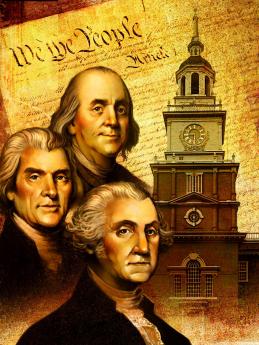
|
| Constitution |
THERE is little doubt many state legislatures behaved in a capricious and high-handed way in the twenty years prior to the 1787 Constitution. Outrage at this behavior was one of the important stimulants to writing the Constitution, as well as putting public pressure on state legislatures to ratify it in 1788. Section 10 of Article 1 is devoted to limitations on state behavior deemed to be generally offensive or otherwise contrary to the national interest. Among the comparatively short list of absolute prohibitions is found "No state shall......, pass any law.....impairing the obligation of contracts, or grant any title of nobility." This section condemns certain behavior as indefensible but does not specify the Federal government to be similarly limited, along with the states. However, the government which was established as one of the limited federal powers. Unless a power was specifically granted to the Federal government, the Tenth Amendment announces it belongs to the states, or, as the Ninth Amendment would have it, to the people. There seemed no need to limit the scope of a power which could not exist. The Tenth and final Amendment in the Bill of Rights ended the 1791 Constitution with the words:
X. The powers not delegated to the United States by the Constitution, nor prohibited by it to the states, are reserved to the States respectively, or to the people.
A modern capsulation might be: the Federal Government is no more empowered to impair the sanctity of contracts than it is to grant titles of nobility.
The Framers of the Constitution were inexperienced in the habits of a republic, or they might have anticipated the general tendency of those who are empowered to enforce the law, to flout it in their own behavior. Around the smallest courthouse in the nation, one need not be surprised to find the Sheriff or other local worthies, parking their cars in illegal spots without fear of punishment. It is not just state legislatures who are tempted to disobey the laws they pass, but a general tendency of all authority to do so. It requires a local citizenry with a very short fuse, displaying instant hostility to the first sign of this sort of swaggering, to keep their local newspapers from filling up with scandal stories in the weeks before an election. Many of these stories are politically motivated, of course, but it must be admitted that in a naughty world, they are necessary.
 No State shall enter into any Treaty, Alliance, or Confederation; grant Letters of Marque and Reprisal; coin Money; emit Bills of Credit; make any Thing but gold and silver Coin a Tender in Payment of Debts; pass any Bill of Attainder, ex post facto Law, or Law impairing the Obligation of Contracts, or grant any Title of Nobility. No State shall, without the Consent of the Congress, lay any Imposts or Duties on Imports or Exports, except what may be absolutely necessary for executing it's inspection Laws: and the net Produce of all Duties and Imposts, laid by any State on Imports or Exports, shall be for the Use of the Treasury of the United States; and all such Laws shall be subject to the Revision and Control of the Congress. No State shall, without the Consent of Congress, lay any duty of Tonnage, keep Troops, or Ships of War in time of Peace, enter into any Agreement or Compact with another State, or with a foreign Power, or engage in War, unless actually invaded, or in such imminent Danger as will not admit of delay. 
|
| Article One, Section 10 |
A 21st Century illustration is found in a letter sent to current beneficiaries of Social Security, reducing their monthly check by twenty or more percent in some cases, and in other cases just a few dollars. The notice says that this deduction is based on IRS reports of the individual's income, using material supplied by the Internal Revenue Service, thereby triggering an additional side question about the right of the government to use supposedly private information to impair the obligation of the Social Security contract. Setting the privacy issue aside, what is illustrated is an even more discouraging violation of the expectations for fair dealing. This is a privacy right which might have been enforced by an excruciating repetition of the time-consuming requirement of manual specification. Now that computers are more common, what formerly needed no specification, now perhaps begins to need it, since endless repetition is now so tediously conventional.
Governments casually violate the sanctity of contracts when it is self-serving to do so, and presumably, it can be shown that they neglect to violate, or even punish those who violate, whenever such violations are to the advantage of anyone else. It has been said that this matter has been adjudicated in favor of the government in the past, thus creating a precedent, stare decisis, so to speak. Whatever the logic of such precedents, growing Constitutional literacy among the public is going to demand that the matter be re-argued. That is to say, it is comparatively easy to imagine growing knowledge about the Constitution among the citizens, while it will never be easy to expect the public to puzzle through the steps in a judicial chain which explicates how the reverse is now a superior view. Therefore, the demand for re-argument should be a growing one.
IF ALL MEN WERE ANGELS, NO CONSTITUTION WOULD BE NECESSARY
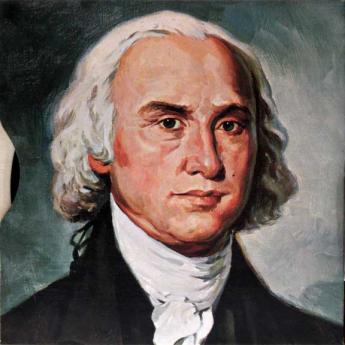
|
| James Madison |
JAMES Madison, Washington's floor manager at the Constitutional Convention of 1787 in Philadelphia, stated the main necessity for holding the Convention at all arose from selfish and untrustworthy human nature. The assembly probably understood exactly who he had in mind, although that is a little unfair to residents of Virginia. He really meant everybody. In the theology of the time, mankind was stained with original sin. Particularly in France, many 18th century romanticists responded to the Enlightenment by defiantly declaring human nature is born pure in heart. In their view, current evils grow from the pollution of civilization, without which it might be possible to have no government at all. At its root, such romanticism was an outcry against progress and civilization, blaming the world's troubles on the Industrial Revolution, so to speak. From Madison's skeptical viewpoint, the most awkward feature of the Romantic Period was its adoption by his Francophile friend and neighbor, Thomas Jefferson, the current American ambassador to France. Madison recognized that Jefferson and Patrick Henry were prepared to assail any attempt to add the slightest power to a central government, particularly if it weakened the power of Virginia. As indeed they promptly came forward to do and nearly succeeded.
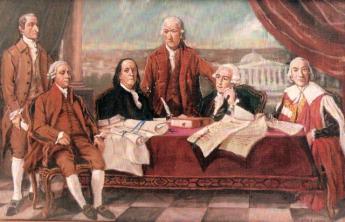
|
| Treaty of Paris |
After fighting an eight-year war for freedom, American belief was wide-spread that it was time to draw back from such anarchy. But there was widespread suspicion in every other direction, too. England seemed to concede, not defeat but only current military overstretch, possibly displaying reluctance to see its former colonies with full sovereignty. George III might wait for America to weaken itself and then try to take them back. Britain almost couldn't do anything right; it was also possibly up to no good when the Treaty of Paris astonishingly conceded land to the Mississippi instead of stopping at the Appalachians. Even our ally France nursed regrets for its somewhat older concessions after the French and Indian War. If even the two mightiest nations of Europe could not maintain order in the vast North American wilderness, perhaps they felt the inexperienced colonies would soon collapse from the effort. Further intra-European wars seemed likely, and could soon spread from Europe to the Western hemisphere. The guillotine was bad enough, Bonaparte would be worse. Our governance as a league of states was in fact, only a league of armies. The Articles of Confederation would not quell inter-state rivalries in peacetime, as only four years (1783-87) experience after the Treaty of Paris were clearly foreshadowing. It was time we listened to Benjamin Franklin, who had been arguing since the Albany Conference of 1745 for unification of the colonies, and to Robert Morris who had been arguing for a written constitution since 1776, a bicameral legislature since 1781, government by professional departments instead of congressional committees, and the ability to levy national taxes -- since at least 1778. Professor Witherspoon of Princeton had provided some ideas about how to make these proposals self-enforcing, Washington was firmly behind a Republican system and opposed to a monarchy. On the other hand, everyone knew that under the Articles of Confederation the thirteen States had often refused to pay their share, abused their ability to deal independently with foreigners, dealt unfairly with their neighbors, and capriciously mistreated their own citizens. It was time to act boldly. With a blue-ribbon convention of national heroes behind these simple ideas, surely it would be possible to convince the sovereign state legislatures to dethrone themselves.
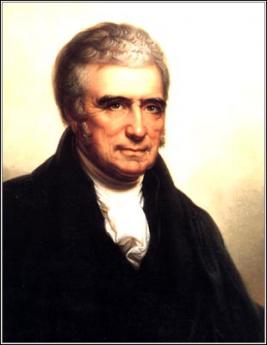
|
| John Marshall |
Two men quietly applied even deeper thinking than that; Benjamin Franklin of Pennsylvania, and John Marshall of Virginia. Both of them had served in state legislatures, both were dismayed by the experience. Franklin also had a long period of close-up observation of the British Parliament, suffering personal abuse there, and had reason to reflect on the earlier abuses by that Parliament under Cromwell during the English Civil War. Certain bad tendencies seemed universal in legislative bodies. Although John Marshall was not a member of the Virginia Constitutional delegation in 1787, he was active in the politics of the group it represented back home. Both Marshall and Franklin had reason to be uneasy about misbehavior in representative bodies, whether called legislatures, congresses, or parliaments. When people said states misbehaved under the Confederation arrangement, they really meant legislatures misbehaved. Franklin did what he could within the Convention to curb this observed behavior by enumerating limited powers and endorsing power balanced against power. When he had nudged it as far as he could, he wearily agreed to give the product a try. Franklin did not trust Utopias, but he had lived among Quakers for years, observing one Utopian society which seemed to endure without resorting to tyranny.
The Constitutional provisions in Article I, Section X became the heart of what the 1787 Convention wanted to change about the relationship of the national and state governments.
States are forbidden to ...
"emit bills of credit, make anything but gold or silver a legal tender in payment of debts, pass any bill of attainder, ex post facto law, or law impairing the obligation of contracts."
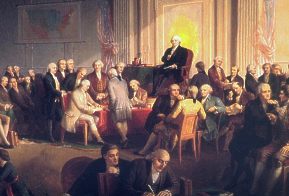
|
| 1787 Convention |
This brief clause is almost a presentment of what state legislatures were doing, which serious patriots regarded as wholly unacceptable. Failure of states to abide by the terms of international treaties must be included in such a summary, although the new Constitution went beyond the powers of states by locating treaties beyond the power of even Congress to change, once ratified. Some observers in fact feel that within the First Article clause, protecting the sanctity of contracts was really the nut of the matter. In one way or another, most states seemed to resort to paying their debts with inflation, somehow failing to recognize that borrowing never pays debts, it only postpones them. The great bulk of this new nation's business was to be conducted as voluntary agreements between two contracting parties. The State -- and the states -- were to stay out of the private sector, except as referee, to see that both sides kept their agreements. As a footnote, the matter of government intervention in private affairs was to rise again in the behavior of the Executive branch in the 1937 Court Packing uproar, and in the 2009 health insurance legislation. Some critics, therefore, have discomfort that the heaviest Constitutional weight was placed by the Founding Fathers on protecting private property. Are not other issues more important, they ask, like life, liberty and the pursuit of happiness? The Founders, of course, we're here not ranking benevolences by value; they were stating principal urgencies for convening the meeting. In a strange unintended way, they here stumbled on the right to property as the foundation for all other rights. But John Marshall understood it was true and was to spend thirty years hammering it into place. People broke individual promises by defaulting on debts; they simply did the same as governments, using inflation.
4 Blogs
Restoring the Gold Standard by Levering Judges' Salaries
 Advocates of a gold standard may just have found an effective "gotcha".
Advocates of a gold standard may just have found an effective "gotcha".
Selection of Judges
 There is no perfect way to select judges, but the British system of distinguishing barristers from other lawyers has much to recommend it.
There is no perfect way to select judges, but the British system of distinguishing barristers from other lawyers has much to recommend it.
Sanctity of Contracts
 Article I of the Constitution, states in section10 that "No state shall......pass any law.....impairing the obligation of contracts, or grant any title of nobility." While the Constitution does not precisely say the Congress may not do so, or the President might not, it is definitely omitted from the list of limited federal powers. And it is the enduring expectation of the citizenry that the federal government is no more encouraged to impair the sanctity of contracts than to grant titles of nobility.
Article I of the Constitution, states in section10 that "No state shall......pass any law.....impairing the obligation of contracts, or grant any title of nobility." While the Constitution does not precisely say the Congress may not do so, or the President might not, it is definitely omitted from the list of limited federal powers. And it is the enduring expectation of the citizenry that the federal government is no more encouraged to impair the sanctity of contracts than to grant titles of nobility.
IF ALL MEN WERE ANGELS, NO CONSTITUTION WOULD BE NECESSARY
 A lot of shrewd thinking went into the checks and balances of the Constitution, some of it in quaint language.
A lot of shrewd thinking went into the checks and balances of the Constitution, some of it in quaint language.